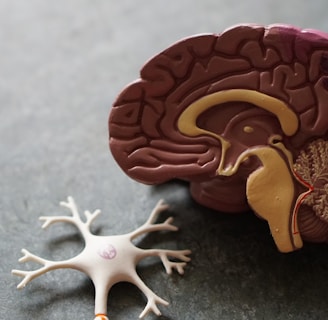Breaking Boundaries: NAD+ and NMN's Influence on Fighting Cognitive Aging and Decline
Dion Soh
3/31/20243 min read


In the quest for longevity and healthy aging, scientists are constantly exploring new avenues to combat the natural decline of cognitive function that comes with age. One area of focus that has gained significant attention is the role of NAD+ (nicotinamide adenine dinucleotide) and NMN (nicotinamide mononucleotide) in promoting brain health and fighting cognitive aging.
The Role of NAD+ in Cognitive Function
NAD+ is a coenzyme that plays a vital role in various cellular processes, including energy production and DNA repair. It is involved in the regulation of numerous enzymes, including sirtuins, which are known to have anti-aging properties.
Studies have shown that NAD+ levels decline with age, leading to a decrease in cellular energy production and an increased susceptibility to age-related diseases. This decline in NAD+ levels has been linked to cognitive decline and neurodegenerative disorders such as Alzheimer's disease.
By supplementing with NAD+ precursors like NMN, scientists aim to restore NAD+ levels in the body and potentially slow down the cognitive aging process. NMN is a precursor to NAD+, meaning it can be converted into NAD+ in the body.
The Potential of NMN in Cognitive Health
Research has shown promising results regarding the potential benefits of NMN supplementation on cognitive health. In animal studies, NMN has been found to improve cognitive function and memory performance.
One study conducted on mice demonstrated that NMN supplementation reversed age-related cognitive decline by restoring NAD+ levels in the brain. The mice exhibited improved spatial memory and learning abilities, suggesting that NMN has the potential to enhance cognitive function.
Furthermore, NMN has also been found to protect against neurodegenerative diseases. In a study on Alzheimer's disease, NMN administration reduced the accumulation of amyloid-beta plaques, which are characteristic of the disease. This suggests that NMN may have a protective effect against neurodegeneration and cognitive decline.
The Mechanisms Behind NAD+ and NMN's Effects
So, how do NAD+ and NMN exert their effects on cognitive aging and decline? One key mechanism is their involvement in mitochondrial function. Mitochondria are the powerhouses of our cells, responsible for generating energy. As we age, mitochondrial function declines, leading to decreased energy production.
NAD+ is a critical regulator of mitochondrial function. By maintaining optimal NAD+ levels, mitochondrial function can be preserved, ensuring efficient energy production. This, in turn, supports brain health and cognitive function.
Additionally, NAD+ and NMN have been found to activate sirtuins, a group of proteins that play a role in cellular homeostasis and stress response. Sirtuins have been linked to longevity and are thought to protect against age-related diseases. By activating sirtuins, NAD+ and NMN may help to mitigate the effects of cognitive aging and decline.
Supplementation and Future Directions
While the research on NAD+ and NMN's influence on cognitive aging and decline is still in its early stages, the results so far are promising. Animal studies have shown positive effects, but more research is needed to determine the efficacy and safety of NMN supplementation in humans.
It is important to note that supplements should be approached with caution and under the guidance of a healthcare professional. As with any supplement, individual responses may vary, and potential side effects or interactions with medications should be considered.
As the understanding of NAD+ and NMN continues to evolve, scientists are exploring other potential benefits of these compounds. In addition to cognitive health, NAD+ and NMN have been implicated in other areas such as cardiovascular health, metabolic function, and longevity.
Conclusion
The exploration of NAD+ and NMN's influence on cognitive aging and decline represents an exciting frontier in the field of aging research. By targeting the cellular processes involved in cognitive decline, scientists hope to develop interventions that can enhance brain health and promote healthy aging.
While more research is needed to fully understand the mechanisms and potential benefits of NAD+ and NMN supplementation, the initial findings are promising. As our understanding of these compounds grows, they may hold the key to breaking boundaries and improving cognitive health in the aging population.
